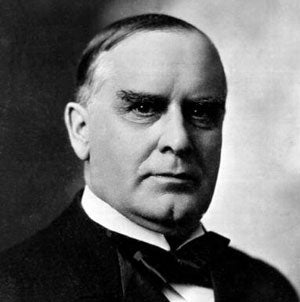
Your support helps us to tell the story
From reproductive rights to climate change to Big Tech, The Independent is on the ground when the story is developing. Whether it's investigating the financials of Elon Musk's pro-Trump PAC or producing our latest documentary, 'The A Word', which shines a light on the American women fighting for reproductive rights, we know how important it is to parse out the facts from the messaging.
At such a critical moment in US history, we need reporters on the ground. Your donation allows us to keep sending journalists to speak to both sides of the story.
The Independent is trusted by Americans across the entire political spectrum. And unlike many other quality news outlets, we choose not to lock Americans out of our reporting and analysis with paywalls. We believe quality journalism should be available to everyone, paid for by those who can afford it.
Your support makes all the difference.
When McKinley became President, the 1893 depression had almost run its course. McKinley had opposed the "free and unlimited coinage of both silver and gold" advocated by the Democrats and had the strong financial support of the business community, notably Mark Hanna, the Cincinnati financier. This earned him the largest majority of popular votes since 1872.
Born in Niles, Ohio, in 1843, he had fought in the Civil War, then studied law, married the daughter of an Ohio banker and been elected to Congress at the age of 34. During his 14 years in the House, he had become the leading Republican tariff expert, giving his name to the measure enacted in 1890. Deferring action on the money question, he called Congress into special session to enact the highest tariff in history.
In the business-friendly atmosphere of the McKinley administration, industrial combinations developed at an unprecedented pace. But McKinley did condemn trusts, as "dangerous conspiracies against the public good". He championed the gold standard and the protective tariff, but also advocated reciprocal trade treaties to open up overseas markets.
But it was foreign policy that dominated his administration. "I have been through one war," he said early in his tenure. "I have seen the dead piled up, and I do not want to see another." But when the press began to clamour for war with Spain over Cuba – where revolutionaries were trying to throw off Spanish imperial rule – he was unable to resist the pressure, especially when the US battleship Maine was sunk in a mysterious explosion in Havana harbour. The Spanish-American War of 1898 proved a predictably overwhelming triumph for the US, resulting in the destruction of the Spanish fleet, the liberation of Cuba, and the annexation of the Philippines, Guam and Puerto Rico. McKinley also authorised the annexation of Hawaii, and provided military assistance to the British in the suppression of the Boxer Rising in China.
McKinley was re-elected comfortably in 1900. But his second term proved tragically short. At the Buffalo Pan-American Exposition in September 1901, he was shot by Leon Czolgosz, a deranged anarchist. He died eight days later.
In his own words
"Unlike any other nation, here the people rule, and their will is the supreme law. It is sometimes sneeringly said by those who do not like free government, that here we count heads. True, heads are counted, but brains also."
In others' words
"He had a way of handling men so that they thought their ideas were his own." Elihu Root
"William McKinley has left us a priceless gift in the example of a useful and pure life, in his fidelity to public trusts and in his demonstration of the value of kindly virtues that not only ennoble but lead to success." Grover Cleveland
"McKinley has no more backbone than a chocolate eclair." Theodore Roosevelt
Minutiae
He was the first truly media-conscious president, establishing the White House press-room and encouraging the flow of selected information to journalists.
He always insisted that his wife, who suffered from epilepsy, sat next to him during state dinners. If she underwent a seizure, he would protect her dignity by covering her face with a napkin or handkerchief.
Ohio adopted the red carnation as its state symbol in McKinley's honour, who always wore one while campaigning.
He was the first president to be caught on film.
After he had been shot, he saw his guards attacking his assassin and cried out: "Don't let them hurt him." He then asked his attendants to be particularly careful of how they broke the news to his wife.
He was the last president to have fought in the Civil War.
His two daughters died during infancy.
Join our commenting forum
Join thought-provoking conversations, follow other Independent readers and see their replies
Comments